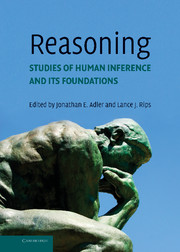Book contents
- Frontmatter
- Contents
- Preface
- List of Contributors
- Introduction: Philosophical Foundations
- PART I FOUNDATIONS OF REASONING
- PART II MODES OF REASONING
- Section 3 Deductive Reasoning
- Section 4 Induction
- Section 5 Dual and Integrative Approaches
- Section 6 Abduction and Belief Change
- 23 Defeasible Reasoning
- 24 Explanatory Coherence
- 25 Belief Revision
- 26 Belief, Doubt, and Evidentialism
- 27 Reflections on Conscious Reflection: Mechanisms of Impairment by Reasons Analysis
- 28 Belief Change as Propositional Update
- Section 7 Causal and Counterfactual Reasoning
- Section 8 Argumentation
- PART II INTERACTIONS OF REASONING IN HUMAN THOUGHT
- Index
- References
23 - Defeasible Reasoning
Published online by Cambridge University Press: 05 June 2012
- Frontmatter
- Contents
- Preface
- List of Contributors
- Introduction: Philosophical Foundations
- PART I FOUNDATIONS OF REASONING
- PART II MODES OF REASONING
- Section 3 Deductive Reasoning
- Section 4 Induction
- Section 5 Dual and Integrative Approaches
- Section 6 Abduction and Belief Change
- 23 Defeasible Reasoning
- 24 Explanatory Coherence
- 25 Belief Revision
- 26 Belief, Doubt, and Evidentialism
- 27 Reflections on Conscious Reflection: Mechanisms of Impairment by Reasons Analysis
- 28 Belief Change as Propositional Update
- Section 7 Causal and Counterfactual Reasoning
- Section 8 Argumentation
- PART II INTERACTIONS OF REASONING IN HUMAN THOUGHT
- Index
- References
Summary
The Inadequacy of Deductive Reasoning
There was a long tradition in philosophy according to which good reasoning had to be deductively valid. However, that tradition began to be questioned in the 1960s, and is now thoroughly discredited. What caused its downfall was the recognition that many familiar kinds of reasoning are not deductively valid, but clearly confer justification on their conclusions. Here are some simple examples:
PERCEPTION
Most of our knowledge of the world derives from some form of perception. But clearly, perception is fallible. For instance, I may believe that the wall is gray on the basis of its looking gray to me. But it may actually be white, and it only looks gray because it is dimly illuminated. In this example, my evidence (the wall's looking gray) makes it reasonable for me to conclude that the wall is gray, but further evidence could force me to retract that conclusion. Such a conclusion is said to be justified defeasibly, and the considerations that would make it unjustified are defeaters.
INDUCTION
There is one kind of reasoning that few ever supposed to be deductive, but it was often conveniently ignored when claiming that good reasoning had to be deductive. This is inductive reasoning, where we generalize from a restricted sample to an unrestrictedly general conclusion. For example, having observed a number of mammals and noted that they were all warm-blooded, biologists concluded that all mammals are warm-blooded. Hume's concern with induction was just that it is not deductive.
- Type
- Chapter
- Information
- ReasoningStudies of Human Inference and its Foundations, pp. 451 - 470Publisher: Cambridge University PressPrint publication year: 2008
References
- 26
- Cited by



